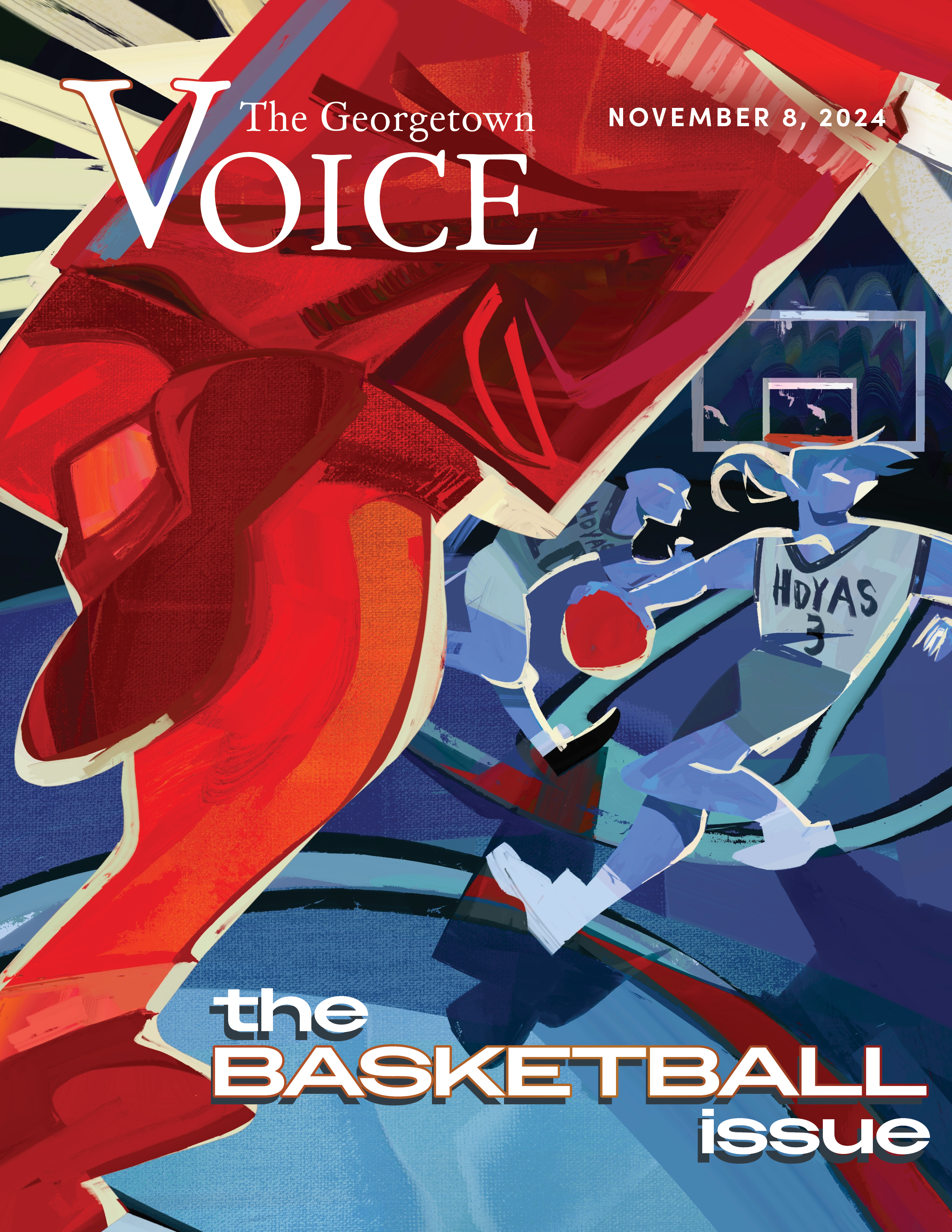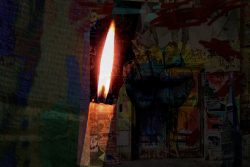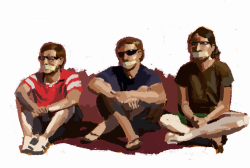At a panel discussion about Jesuit identity earlier this week, Father John O’Malley scanned the twenty or so faces in the spacious sitting room in Wolfington Hall. Fewer than half of the faces belonged to students, most of whom drifted out of the room before the discussion was finished.
“True to Catholic form, you’re all sitting in the back,” he chuckled.
O’Malley kicked off the event—titled “Jesuit Education … So What?” and held as part of Georgetown’s Jesuit Heritage Week—with an overview of the history of Jesuit education, describing the first Jesuits as an edgy bunch that were ahead of their time.

“They faced a lot of criticism for the introduction of dance and the arts into their schools,” he said. “They studied what was the forerunner of the modern, natural sciences. Jesuit universities sponsored some of the first organized sports.” Beside him, Fr. Kevin Fitzgerald nodded vigorously.
By pointing out that Jesuits were the original sports fans, O’Malley sent the same message emitted by nearly every event that the Jesuit community has hosted this week: in the contemporary world, Jesuit education is not obsolete. The same message could be heard in the Jesuit community’s Spirituality Series held in Copley Crypt, where O’Malley described Ignatius of Loyola’s “Spiritual Exercises” as “a remarkably adaptive book and program.” This year, Georgetown’s Jesuit Heritage Week seemed not only to showcase the University’s Jesuit identity, but to insist upon the compatibility of Jesuit education and the contemporary world.

One Jesuit familiar with the challenge of connecting secular culture with Jesuit values is Fr. Alvaro Ribeiro. An expert in British and Shakespearian literature hailing from England, Ribeiro has a commanding voice, a spectacular vocabulary and no reservations about observing the connections between Jesuit tradition and secular literature.
“When people learn that I am an English professor, they are aghast,” he said. “They cry, ‘You are a man of God, you are supposed to speak of things of God!’ To which I tell them I find the Word to be expressed in a hell of a lot of words, including ‘to be or not to be.’”
In the true spirit of Jesuits, Ribeiro has been active in live drama here on campus.
“When I saw that the Davis Center was to be inaugurated with a performance of ‘A Winter’s Tale,’ I said to myself, ‘Hum! I know something about ‘A Winter’s Tale.’ I shall volunteer to show that the Jesuits are still around and still engaged in the theater!’ I volunteered to be the bear.”
The philosophy of Jesuit education, say Georgetown’s Jesuits, holds that the ultimate goal of pursuing knowledge is to understand the whole human being. It is distinct from Catholic education in that it is more than religious instruction, if it is even that.
“At the very heart of Jesuit tradition, it is understood that the academic life only makes sense in the context of an unfolding human being,” Assistant Dean Fr. Ryan Maher said. “Something like literature is a vehicle for understanding culture and therefore, ultimately, the human person.”

Even though they are proponents of liberal education, Georgetown’s Jesuits are no less answerable to the Vatican than a parish priest is. In an era when religion is often felt to be at odds with modernity, globalization and science, simultaneously maintaining the roles of a Jesuit university and a research institution can seem like too much for one school.
Georgetown’s Jesuit community has chosen to advertise the contemporary relevance of Jesuit education at a time when the Jesuit presence here on campus is at an historical low. For many students, the extent of their interaction with Georgetown’s Jesuit community in four years here may be confined to a near accident with a speeding Jesuit golf cart.
“I know a lot of people who have never had a Jesuit professor,” Maureen Dolan-Galaviz (COL ‘08) said. “They really miss out because unless you’ve had that experience, you don’t really know what it’s like.”
Though many faculty members and others beyond the Hilltop consider Georgetown to be the premier Jesuit university in the country, fewer and fewer professors are actually Jesuit priests. According to Fr. John Langan, the rector of Georgetown’s Jesuit community, Georgetown housed about 100 Jesuits in 1966. In 1986, it housed 85. Today, 55 Jesuits live in Georgetown’s Jesuit community, and only 34 are actually working in the University.
The phenomenon of the disappearing Jesuit is not unique to Georgetown: the nation’s 27 other Jesuit colleges and universities also find themselves challenged by the dearth of young Jesuits.
“It’s a matter of significant concern to me,” Fr. Maher said of the diminished presence of Jesuit faculty at Georgetown. “How do we perpetuate our own tradition when there aren’t as many of us to follow in our place? One thing we can do is depend on non-Jesuits who share our values and teach here at Georgetown.”
Dean Hubert Cloke, who interviews many of the undergraduate faculty candidates interested in teaching at Georgetown, is confident that the University’s hiring process turns out a faculty that has the potential to grow committed to Jesuit educational values.

“I don’t go into the search process looking for that,” he said. “I want to make sure these people are interested in teaching undergrads. Once someone comes with that predisposition to teach, they accept other facets of the institution which they become a part of.”
Cloke believes that being perceived as the Ivies’ academic peer may give Georgetown an edge over the 27 other Jesuit universities in attracting young priests, but recognizes that the future of Georgetown’s Jesuit identity is in jeopardy.
“There have to be some Jesuits,” he said. “You need somebody who’s going to remind people what it’s all about.”
Cloke, who was in the Society of Jesus for 13 years before leaving, says, “The big challenge with the Jesuits is and always has been that it takes a long time to become a Jesuit. To many, there other kinds of work that seem more important.” Becoming qualified to teach at a university adds years to the vocational study itself.
Given the scarcity of Jesuit faculty and the changing responsibilities of a university president, it is also unlikely that Georgetown will ever have a Jesuit president again.
“My experience is that having a Jesuit in that job guarantees nothing,” Fr. Maher said. “In many ways, Dr. DeGioia is a more effective president than some Jesuit presidents at preserving the school’s Jesuit identity, the way he understands the connection between the life of the mind and the life of the spirit.”

However, as is the case with Georgetown’s faculty, nothing ensures that future presidents will embody Jesuit values to the extent that DeGioia does.
“It’s whoever the board of trustees chooses as president,” Fr. Maher said.
Fr. Maher points out that students themselves are partly responsible for connecting with Georgetown’s Jesuit mission.
“To get a real Jesuit experience at Georgetown, you have to want to get it,” he said.
Despite their diminished presence, some Jesuits feel that Georgetown’s Jesuit tradition is reflected in the choices that students are making, pointing to the remarkable degree to which students here are active in community service organizations.
“Social justice has become a very timely facet of Jesuit tradition,” Fr. Christopher Steck said. “Jesuits have always believed that students should come close to the reality of the world. And programs that the CSJ [Center for Social Justice] hosts help them do just that.”
While Cloke acknowledges that students are heavily involved in community service at other universities, he believes that, “Here, it’s part of the air you breathe. Service is expected of you.” He added that, “Statistics says that people here are getting it.”
Cloke and many Jesuits see a difference between the priorities emphasized at Georgetown and its peer institutions.
“At top-notch universities, they stress ‘academic excellence, academic excellence, academic excellence,’ and nothing comes after that in the sentence. What they teach and what their students do don’t resonate in any larger context,” he said.
The Jesuit order has a well-documented history of mixing secular philosophy and religious theory. In the first Jesuit schools, students studied pagan texts as part of what Fr. O’Malley called their humanist education. During Fr. Ribeiro’s portion of “Jesuit Education … So What?”, Fr. Jon O’Brien chimed in from the audience with the observation that Georgetown took on a leading role in American scientific research in the post-Sputnik science craze.
But as science butts heads with the Catholic Church on contemporary issues such as stem-cell research, the relationship between the Jesuits and the pursuit of knowledge is growing increasingly awkward. Fr. Fitzgerald, the third speaker at the discussion panel who holds a degree in both philosophy and molecular biology, noted that “Catholics’ role in learning and medicine extends far back into history.” But in today’s world, Fitzgerald sees religion as less connected to science.
“Our emphasis in the world today is on fixing when it ought to be on healing,” Fitzgerald said. “Advancing knowledge is great, but it’s not enough. Technology never solves the human condition. The human condition is what it is. It can never actually be fixed because it is human, and it ought to be explored.”
At “Jesuit Education … So What?” Ribeiro mused about the future of Jesuit tradition at Georgetown in the context of what has happened at other high-caliber research institutions which once had religious identities of their own.
“The more research-oriented that Yale, Princeton, Harvard, and Boston University became, the more they found it absolutely requisite to cast off their religious moorings,” he said.
According to Ribeiro, those same institutions are now pressing Georgetown to do the very opposite. At a conference of top-tier research institutions entitled, ‘Whither Georgetown?’, where several universities met to discuss Georgetown’s future as a research institution, a representative from Harvard University urged Georgetown to maintain its Jesuit identity.
Ribeiro concluded by telling the story of a man who interviewed for a professorship at Boston University, a university that once identified itself as Methodist.
“When he asked about the University’s Methodist legacy, the interviewer hastily explained, ‘Oh no, that’s all in the past, it makes no difference whatsoever to our research!’” Ribeiro said. “The poor man said, ‘What a pity! I myself am Methodist, and I was rather hoping to find a welcome here!’ The interviewer said, ‘No, no, we are utterly secular!’”
“Is that what we are going to be saying about Georgetown in fifty years?” Ribeiro asked. He leaned intently toward the handful of students and faculty seated before him. “The jury is still out over whether we shall succeed or crash and burn.”




